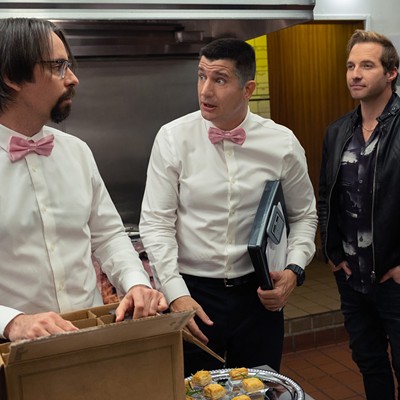Wednesday, October 6, 2010
Hey, everybody! Let's fix Glee!
Fix Glee!?
“But OMG, Glee is soooo amazing!,” every female Whitworth University alum on my Facebook feed argues.
True,
Glee is successful. It kills in the ratings. It makes phenomenal money.
Its fans are rabid. So why fix it? Because Glee can be better. Rather, Glee can
be better more often. Sometimes, like last night, it’s a hilarious,
affecting, powerful episode of television. Other times (like the week
before), it’s embarrassingly awful.
Glee, in
other words, is the perhaps the most wildly inconsistent show on
television. Can that be fixed? Can we have the highs of Glee without
the lows?
Some people, like MacLean‘s magazine TV critic Jamie Wienman (@weinmanj), argue that Glee is unfixable. The big problem with Glee — its chaotic, scattershot nature — is precisely what makes it so appealing, he says. Take away the scattershot, take away Glee's unique attraction.
But I disagree. I think the elements of Glee — the satire, the humor, the showmanship, the emotion, the tracksuits — are damaged by Glee’s flaws. Fix these flaws, and I believe you could see a popular show — your favorite show — become even more popular.
1. Pick one showrunner to rule them all. Glee, AV Club critic Todd VanDerWerff (@tvoti) wrote last year, is really three shows. It has three showrunners (Ryan Murphy, Brad Falchuk and Ian Brennan), each with a different vision for what Glee can be. Murphy, VanderWerff argues, wants Glee to become a sort of twisted afterschool special, Falchuk wants to explore the underlying sadness and failure of the characters, while Brennan wants to deepen the teenagers into more complex characters.
So episode to episode, Glee morphs from one type of genre than an other. It’s cynical one week, sentimental the next. It’s possible to have a single show skip through a variety of tones — Scrubs was wacky comedy and tear-jerking drama — but it’s not easy to reconcile these tones when three showrunners are pulling in different directions. Instead, we get whiplash, as one episode is cynical, and the next is sweet, and the next is about Madonna.
“Turn it over to one of the three writers as primary showrunner and hire some other writers,” VanderWerff suggests on Twitter. ---
2. Stick to your stories. Most dramas these days require you play catch up to understand what is happening. Glee is that rare show that makes more sense if you watch one episode, randomly, than every single week.
Glee actually had an entire breakup happen on the“previously on Glee” segments. Personalities rise and fall on a whims of an episode. Allegiances change — for a an hour — and then change back. Continuity and characterization is blown, loudly, into a Kleenex and then trashed.
In Season One, there was a very long time that, I’m pretty
sure, the show completely forgot Quinn was supposed to be pregnant.
Glee has a habit of discarding plots with weeks of potential, somehow only clinging to awful plot lines. (Terri fakes a pregnancy!) The more crazy things that happen to the characters, and the more often those crazy things are squeegeed away in a single clumsy stroke, the less we care about what happens for the characters.
Glee has a
rabid fan base that would absolutely love to gossip and speculate about
their favorite characters. But by making the events in their lives so
temporary, the soapy potential of Glee is entirely squandered.
Chart some plot lines. Create a tangible center to hang the divergent
episodes on. Chart some arcs. And stick to them. It will only make your
fan base more devout, and improve the strength of your narratives.
3. Deepen your characters. Everybody
hates Rachel Berry. I don’t (she reminds me of a Whitworth student I
once knew enough to amuse me), but the major problem with characters
like Rachel is that she’s one-note. And that note is increasingly
shrill. Her character needs to add some range of personality.
The
Office improved on the second season because it began to deepen the
characterization of its supporting cast. Glee has started to
do this — giving villain Sue Sylvester a Downs-syndrome-sister to make
her character more nuanced. It was clumsy, but even that gave the show
a little more depth. Sure, it’s fine to compose your cast of
archetypes. But don’t expect us to cry along with Stock Stereotype B.
4. Quit the music video recreation. We get the one-time appeal, the one-time “Hey, it’s the Vogue video with Sue Sylvester” gimmick. But generally, creating a scene-for-scene music video is like the worst kind of assembly skit — where teachers dress up and re-enact, word for word, beat for beat, a Saturday Night Live sketch.
Parody the music video. Change to a more interesting setting. Create an homage, of sorts. But please, don’t spend thousands of dollars doing something that has already been done exactly — and likely better — by somebody else. That’s a waste.
5. Follow your heart, not your iTunes playlist. Here’s
the difference between last night’s fantastic “Grilled Cheesus”
episode, and the last week’s awful Britney Spears episode: “Grilled Cheesus“
awkwardly shoehorned in songs to fit a very clear plot. The Britney
Spears episode awkwardly shoehorned in a plot to fit a very clear
collection of songs. It’s not hard to find songs that vaguely fit an
emotion or a plot development. It is hard, apparently, to write a
comprehensible story given a set list of songs. If Glee concentrates on
plots and then adds their random songs later, I believe both the “we
need plot” camp and the“we need cool songs” camp will be satisfied. Remember: It’s the context around the songs that give them umphhh.
6. Dial back the auto-tune. I
know, I know, slickly polished, auto-tuned songs sell on iTunes. And
sometimes, that’s OK. Fantasy sequences, and super-polished stage
performances should get auto-tuned. The auto-tune can often show us who
the characters see themselves as, when they dream of being great at
night. But there’s something more raw — more intimate — about seeing
our characters belt out their vocals without being turned all T-Pain.
Give us some moments of real singing, the way it actually sounds in the
practice room. And then, sure, rock our socks off with a heavily
produced musical number at the end. And you know what, I bet people
would still buy the practice number on iTunes.
And
the auto-tune that makes every performance sound of the same quality.
That’s a problem. It’d be like Friday Night Lights if the
Panthers/Lions crushed their opponents in every single game. For us to
root for our kids to triumph in the face of adversity, we need to see
the adversity. We need to see their skill grow. We need to actually see
an arc. Not a plateau from“Don’t Stop Believing” to infinity.
7. Eliminate Israel.
Jacob Ben Israel, specifically. Many movie and television writers
create characters who are "critic effigies," geeky losers who
articulate complaints about the show but are so pathetic or
insufferable that the complaints just show their own insecurities.
Think of Comic Book Guy from the Simpsons or an actual critic from M. Night Shamalayan's Lady in the Water.
We’re meant to laugh at their pathetic-ness and cheer when they suffer
the same indignities the writers wish upon their own critics. In the
Glee second season premiere, that was Jacob Ben Israel.
Jacob Ben Israel is a pimply Jew — the gossip blogger of the school — with a massive unkempt fro, and a nasally voice. He’s obsessed with one of the girls in the glee club. He’s the least attractive member of the cast. He’s caught masturbating, completely naked, in the school library. He passes out, in throes of sexual ecstasy, due to watching a sexually charged performance in the auditorium. We’re meant to laugh at how pathetic and ugly and different he is. But Glee is a show that’s supposed to be about celebrating and welcoming the pathetic and ugly and different. Not about laughing at them and rejecting them. Not only is watching Jacob unfunny, cringe-worthy and painful, he’s a contradiction for the entire message of the show. They should write him off Glee, or at least reform him, and then write him off.
8. No more Matthew Morrison rapping. Surely, men and women of all creeds, religions, races and sexual orientations can unite on this single point.
"Let's Fix" is a semi-regular feature in which I, a newbie TV
critic who's never constructed a coherent work of narrative fiction
(assuming we don't count the embarrassing "Salk Wars" Phantom Menace parody in Junior High),
tell professional veteran show-runners how to fix the art
they've spent their lives perfecting. You're welcome, seasoned
professionals. Follow Daniel Walters on Twitter via @danieltwalters
Tags: let's fix , television , TV , Image




















